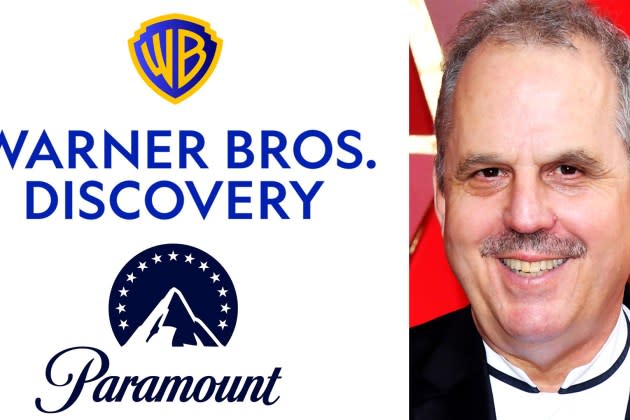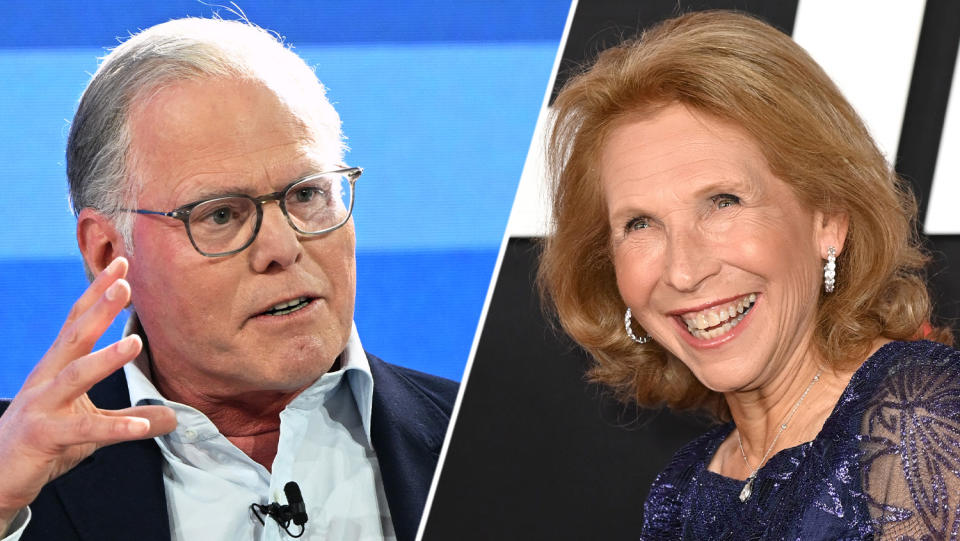Bill Mechanic Argues Against Paramount Global Becoming The Second Fabled Hollywood Studio Stripped Down & Sold For Parts: Guest Column
- Oops!Something went wrong.Please try again later.

Editor’s note: Underplayed in the media intrigue over the prospect of Warner Bros swallowing Shari Redstone’s empire that includes Paramount and CBS is the gloomy reality that another storied Hollywood studio could go the way of Fox. That went from a vibrant, multi-faceted creative content-generating enterprise to a headstone when Rupert Murdoch decided to cash out for Disney stock. David Zaslav spent 2023 kicking employees and finished films to the curb to pay down debt just to get this far; chances are more blood will spill down Melrose if Redstone sells some or all the pieces of Paramount to be mashed into an existing studio. When Bill Mechanic was perched atop Paramount, Disney and Fox, he built Disney’s home video from a $30 million to $3 billion business and found ways to take risks and squeeze max returns from blockbusters from Braveheart to Titanic, Independence Day and many others. Who better to remind Hollywood that once a major studio dies, it never comes back, and that there might be better ways to squeeze better performance out of an established creative business with global pipelines?
Once upon a time, when the L.A. Times was home delivered and read by millions, movies were a dominant form of entertainment. Jim Murray, the legendary columnist, wrote at the time, Los Angeles is “a place where you get 100 days for murder but 6 months for whipping a dog.”
More from Deadline
It’s also a place that was called the Movie Capital of the World, though by now that is the hollowest of crowns. Few movies are made here and fewer still are worth talking about. In fact, it’s quickly becoming a place where movie studios come to rest before dying.
In the past few years, independents have been shuttered and one of the Majors, 20th Century Fox, was dumped by Murdoch and devoured by Disney like a shark devours chum, a hundred years of history eviscerated. Rumors currently abound about another of the original studios, Paramount, being acquired by WB Discovery. If that happens, you can stop looking for it on Melrose. Look instead on Boot Hill.
Why should any care what happens to Paramount, which barely even thinks of itself as a movie company these days? Because for those of us who work in movies as well as those who simply love them, the conglomerates — the pipes — that own the studios don’t give a rat’s ass about movies or the people who care about them. For the most part, they’re all making the same pictures, surprised when something original like Barbie or Oppenheimer resonates in the world (the two biggest movies of the year is a fair amount of resonance). They don’t care about diversity or communal experience, and they have about as much vision as Mr. Magoo (if he’s not a forgotten reference).
When WB disappeared into the smothering embrace of AT&T, they put someone in charge who was too clever for his own good, in much the same way that MLB owners hired a bunch of book-smart but street-dumb Ivy League analytics experts who used statistics to run their teams into the ground. The AT&T/WB exec chased the White Whale of streaming and myopically put a dagger in the film world while dragging down WB’s own finances to the point it was wiped away by an opportunistic Discovery — the same one now trying to absorb Paramount clearly for reasons that have nothing to do with movies. The studio is simply collateral damage.

The damage to the movie ecosystem during the AT&T reign was far greater than either the pandemic or this year’s strikes. There is no question that both hit the business hard, but like restaurants or grocery stores, it would have rebounded. The move to dump everything day-and-date destroyed the confidence of the “pipes” in the tried-and-true business of sequential distribution, narrowed the definition of what deserves to be shown in theatres and destroyed the regular availability of a wide range of movies (not to mention severely injuring the exhibition business). The inconstancy in attendance is not because former moviegoers want to stay locked up in their homes chewing food while wondering how many episodes are left to binge. They can’t go to theatres because for what in now “suitable for theatrical” reeks of a sameness that tells them their choices don’t matter. There’s simply nothing to see. If you aren’t interested in superhero movies or animated films, then your only choice is movies with minuscule budgets, often depressing even when they’re exceptional. No surprise again last year when Everything Everywhere All at Once broke out since it had a big enough budget to be fun and ambitious even with some of the same subject matter as the so-called art films.
When the film business originally evolved, it was owned mainly by businessmen, the Moguls, who lived or died based on making films their audiences wanted. Ignore their wishes and you’d perish. When one indeed failed in the task of satisfying customers, inevitably it was bought by those who were successful in other businesses, whether that was parking lots or cigar factories. The movie business was more interesting. Made them more important. And yes, buried in there was a love of film.
Do any of the studios love movies today? Sure, there are plenty of good people in every studio, but does the studio itself display that love? I’d argue not enough. Things are made because something else like it worked or it was based on a piece of high-profile IP (hate the term). To quote Fight Club, “a copy of a copy,” not what someone’s gut is telling them might just work. Every time something original breaks through, it’s because the talent is pushing it, not the studio. Without Margot Robbie, there’s no Greta Gerwig, and without Gerwig, there’s no originality to Barbie. Chris Nolan, who’s love and appreciation of movies and audiences supporting movies is a godsend, is the sole reason we were treated to Oppenheimer. It certainly wasn’t the studio looking for a three-hour-plus movie, partially in black and white, about the invention of the atom bomb!
No, here’s the adage that I believe is a great truth, yet is often made light of: What works is good movies. Movies people want to talk about, want to tell others about, want to see with audiences, want to laugh or cry or sit in scared silence surrounded by people. Stop asking why the original pictures work — they work when they are good.
RELATED: Paramount’s M&A Conundrum: How To Take Apart A Puzzle That Took Decades To Complete
For the corporate owners of the studios, however, it’s a quest for content, a quest to own what flows through their own pipes so revenue doesn’t get shared. With talent. With theatres. With cable. Greed, as Gordon Gekko said, is good. Today, when a film doesn’t reach a billion in revenue, it’s a waste of resources. Good never enters the equation. If it breaks a billion and no one likes it, don’t worry. Make a sequel.
Size is viewed as a more important asset. Take over a competitor and you gain leverage. One plus one equals three in their minds; so far one plus one, however, doesn’t seem to even equal two. The Majors today are all losing hundreds of millions chasing Netflix and other streamers they ironically helped create (giving them all the product they needed flourish), most blindly barreling along that chase, thinking they see all despite groping the stairs unlit. They don’t realize movies aren’t fueling growth in streaming but rather are victims of it. In perusing Netflix’s viewing-data release, only eight movies are in the top 300 most watched, and none is a major film. As a consumer, I find it impossible to track down virtually any movie I might have missed in theatres.
This is not a piece against the streamers. They are doing a great job at what they should be doing, forging their place in today’s entertainment world, and Amazon, through its purchase of MGM, actually is giving theatrical life to some of its films.
No, as they say, we have met the enemy and the enemy is us. The studios control the life blood of movies and yet stopped caring about their offspring. Paramount, short of the Tom Cruise offerings, haven’t focused much at all on theatrical, so if it disappears, the result may be akin to the sound of a tree falling in a forest.
RELATED: Showbiz Stocks 2023: Tech Surges, Big Media Companies Weather Strikes And Streaming Gets A Reboot
Industry pundits (few with actual experience in the business) will challenge whether a stand-alone studio can flourish today. That’s the same thinking that led to so many to doubt that a stand-alone electric car company could survive in the face of the Big 3, the Germans, the Japanese and Korean auto giants. The answer is self-evident in both cases. There is room for the exceptional to innovate. Just don’t try to be like Mike; not only can’t you be like Jordan, but copying him only makes it worse. Chart your own course and ignore whether someone’s bigger. Worry about being better. Size can be as much a deterrent to success as an enhancement. Big often leads to smugness, ignoring what the public wants, even it doesn’t know what it wants until it sees it. Big often leads to manufacturing and selling what’s sold before, not the next thing. Big can also lead to a bureaucratic miasma stifling innovation. Sound like our business?
Focusing on making — and, perhaps just as importantly, on figuring out how to market and distribute — movies in the cluttered entertainment world would need to become the priority business for a stand-alone studio. Controlling costs, being nimble and with no holds barred, being movie-centric would make such a studio one that talent would gravitate to. Remember it’s not just trusting the studio head but the owners, especially after the past few years of indifference to talent.
RELATED: David Ellison & RedBird Capital Kicking Paramount Global’s Tires Via National Amusements – The Dish
The one glimmer out there for Paramount is that Skydance also is interested in acquiring the studio. While they’ve largely focused on big action films, it’s clear that David Ellison, like his sister, Megan, grew up loving films, and that puts them in a different category. The guess is any sale will come down to the biggest check, but one can hope that Shari Redstone — coming from a lineage of theatrical exhibitors and running the family chain for most of her professional life — will opt give us all a bit more life if the bids are close.
Best of Deadline
TV Cancellations Photo Gallery: Series Ending In 2024 & Beyond
Hollywood & Media Deaths In 2024: Photo Gallery & Obituaries
2024 Premiere Dates For New & Returning Series On Broadcast, Cable & Streaming
Sign up for Deadline's Newsletter. For the latest news, follow us on Facebook, Twitter, and Instagram.

